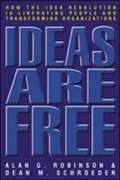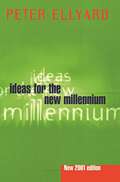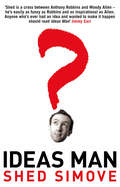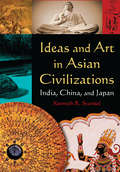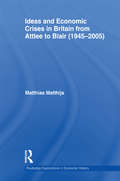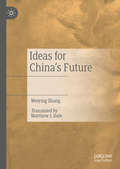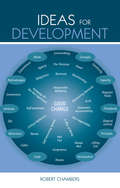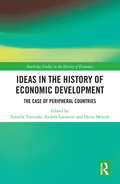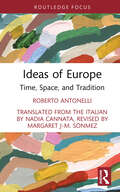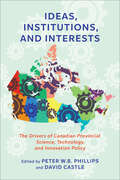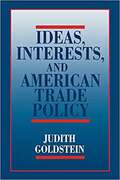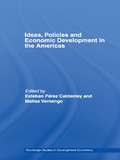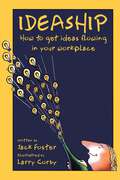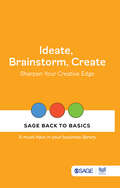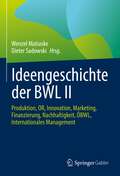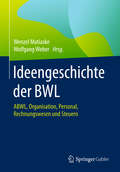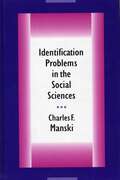- Table View
- List View
Ideas Are Free: How the Idea Revolution is Liberating People and Transforming Organizations
by Alan G. Robinson Dean M. SchroederBecause they're doing the day-to-day work, front-line employees see many problems and opportunities their managers don't. But most organizations fail to realize this potentially extraordinary source of revenue-enhancing ideas.
Ideas Don't Die. Companies Do.: Future-proof your business by creating an ideas-obsessed enterprise
by Hari AbburiRethink ideas as the real value to the future of your business in a technology-world where knowledge is increasingly a commodity In Ideas Don’t Die. Companies Do. renowned voice on disruptive agility and executive Hari Abburi delivers an insightful framework for leaders to future proof their companies by creating an idea obsessed enterprise. In the book, you’ll learn why ideas are more important than customers to disrupt the industry and marketplace. The author explains how to distinguish between ideas that are truly original and those that require strategic execution to differentiate them from other choices on the market. He offers key insights into how to glean information from other companies who have worked with the idea and how to apply that knowledge to your firm’s own idea. Inside the book: Explanations of the “idea moat” that creates exponential value at one company as opposed to another that uses similar ideas Compelling answers to questions about idea timing, and why ideas that failed a few years ago can be successful today How to shift your company’s focus from thinking customers to thinking ideas Perfect for managers, executives, entrepreneurs, founders, and other business leaders, Ideas Don’t Die. Companies Do. will also benefit product team leaders and other innovators with a desire to bring new and exciting ideas to the market.
Ideas For The New Millennium
by Ellyard, Peter'Ellyard prods us to think the unthinkable. For him it's simply a matter of planetry survival.' Elizabeth Dowdeswell, Executive Director 1992-1998 United Nations Environment Programme 'Aspiring 21st-century corporate and community leaders will delight in Peter Ellyard's stimulating ideas and clear and elegant writing style.' Professor Dexter Dunphy, Australian Graduate School of Management, University of New South Wales Peter Ellyard provides a new vision for human prosperity in the 21st century. A new culture is emerging that Ellyard calls 'Planetism'. It has implications for leadership and management, for education and learning, for health and wellbeing, for industrial development, for food production and agriculture, for environmental management and for intercultural relations and understanding. In urging the creation of an ecologically, economically, socially and culturally sustainable Planetist society in the 21st century, Ellyard offers a challenging vision for our own future and that of generations to come. This edition of Ideas for the New Millennium has been revised and updated.
Ideas Man
by Shed SimoveLearn secrets for success and how to unlock your creativity with a book that contains tips on how to achieve anything you desire, and charts the extraordinary and hilarious real-life adventures of Britain's most inspirational IDEAS MAN.Sheridan 'Shed' Simove is a modern day creative genius. He lives and breathes ideas. Every day of his life dozens of new ideas spring from his astonishingly active mind. The ideas can relate to pretty much anything - TV shows, ranges of sweets, executive toys, greeting cards, money-making schemes - the list is endless. And if an idea hasn't been done before, then Shed is sure to attempt it...IDEAS MAN is the true story of this visionary maverick's amazing adventures. At breakneck speed, Shed describes how dozens of his ideas came to be, how they succeed or sometimes disastrously fail. Some of Shed's ideas include: a range of adult sweets called 'Clitoris Allsorts', a groundbreaking documentary that involved him going undercover as a 16-year-old schoolboy (when he was 30) and the launch of his own currency - the 'EGO'. IDEAS MAN is a unique book written by a completely extraordinary character. A hilarious and inspirational real-life tale of eccentricity and enthusiasm, it's perfect for anyone who's ever had a dream and wondered how to make it come true. Shed is living proof that you really can make it happen...
Ideas and Art in Asian Civilizations: India, China and Japan
by Kenneth R. StunkelThis work covers topics related to the exercise of influence by individuals and groups within organizations. It includes an introductory group of articles dealing with the nature of influence processes and power.
Ideas and Economic Crises in Britain from Attlee to Blair (Routledge Explorations in Economic History #50)
by Matthias M MatthijsDuring the period from 1945 to 2005, Britain underwent two deep-seated institutional transformations when political elites successfully challenged the prevailing wisdom on how to govern the economy. Attlee and Thatcher were able to effectively implement most of their political platforms. During this period there were also two opportunities to challenge existing institutional arrangements. Heath's 'U-turn' in 1972 signalled his failure to implement the radical agenda promised upon election in 1970, whilst Tony Blair’s New Labour similarly failed to instigate a major break with the 'Thatcherite' settlement. Rather than simply retell the story of British economic policymaking since World War II, this book offers a theoretically informed version of events, which draws upon the literatures on institutional path dependence, economic constructivism and political economy to explain this puzzle. It will be of great interest to both researchers and postgraduates with an interest in British economic history and the fields of political economy and economic crisis more widely.
Ideas for 21st Century Education: Proceedings of the Asian Education Symposium (AES 2016), November 22-23, 2016, Bandung, Indonesia
by Ade Gafar Abdullah Ida Hamidah Siti Aisyah Ari Arifin Danuwijaya Galuh Yuliani Heli S.H. MunawarohIdeas for 21st Century Education contains the papers presented at the Asian Education Symposium (AES 2016), held on November 22—23, 2016, in Bandung, Indonesia. The book covers 11 topics: <P><P>1. Art Education (AED)2. Adult Education (ADE)3. Business Education (BED)4. Course Management (CMT)5. Curriculum, Research and Development (CRD)6. Educational Foundations (EDF)7. Learning / Teaching Methodologies and Assessment (TMA)8. Global Issues in Education and Research (GER)9. Pedagogy (PDG)10. Ubiquitous Learning (UBL)11. Other Areas of Education (OAE)
Ideas for China’s Future
by Weiying ZhangThis book attempts to convey that ideas matter and China needs right ideas to defeat wrong ideas and to guide its future reform. The successes that China has accomplished over the last 40 years of reform and opening were the result of ideas defeating interests. After the end of the “Cultural Revolution,” Deng Xiaoping initiated market-oriented Reform and Opening because he had new ideas. While China has made great progress in both economic and social development since the beginning of reform and opening, there is still a long way to go to become a liberal society. Although the ideas of political leaders are crucial in the short term for social transformation to take place, the ideas of the common people play a more important role in the long term. The types of new ideas that China needs are proposed in this book.
Ideas for Development
by Robert ChambersOur world seems entangled in systems increasingly dominated by power, greed, ignorance, self-deception and denial, with spiralling inequity and injustice. Against a backdrop of climate change, failing ecosystems, poverty, crushing debt and corporate exploitation, the future of our world looks dire and the solutions almost too monumental to consider. Yet all is not lost. Robert Chambers, one of the ?glass is half full? optimists of international development, suggests that the problems can be solved and everyone has the power at a personal level to take action, develop solutions and remake our world as it can and should be. Chambers peels apart and analyses aspects of development that have been neglected or misunderstood. In each chapter, he presents an earlier writing which he then reviews and reflects upon in a contemporary light before harvesting a wealth of powerful conclusions and practical implications for the future. The book draws on experiences from Africa, Asia and elsewhere, covering topics and concepts as wide and varied as irreversibility, continuity and commitment; administrative capacity as a scarce resource; procedures and principles; participation in the past, present and future; scaling up; behaviour and attitudes; responsible wellbeing; and concepts for development in the 21st century.
Ideas in Context: Free Trade and Its Enemies in France, 1814–1851
by David ToddIn the aftermath of the French Revolution, advocates of protection against foreign competition prevailed in a fierce controversy over international trade. This groundbreaking study is the first to examine this 'protectionist turn' in full. Faced with a reaffirmation of mercantile jealousy under the Bourbon Restoration, Benjamin Constant, Jean-Baptiste Say and regional publicists advocated the adoption of the liberty of commerce in order to consolidate the new liberal order. But after the Revolution of 1830 a new generation of liberal thinkers endeavoured to reconcile the jealousy of trade with the discourse of commercial society and political liberty. New justifications for protection oscillated between an industrialist reinvention of jealousy and an aspiration to self-sufficiency as a means of attenuating the rise of urban pauperism. A strident denunciation of British power and social imbalances served to defuse the internal tensions of the protectionist discourse and facilitated its dissemination across the French political spectrum.
Ideas in the History of Economic Development: The Case of Peripheral Countries (Routledge Studies in the History of Economics)
by Estrella Trincado Andrés Lazzarini Denis MelnikThis edited volume examines the relationship between economic ideas, economic policies and development institutions, analysing the cases of 11 peripheral countries in Europe, Latin America and Asia across the nineteenth and twentieth centuries. It sheds light on the obstacles that have prevented the sustained economic growth of these countries and examines the origins of national and regional approaches to development. The chapters present a fascinating insight into the ideas and visions in the different locations, with the overarching categories of economic nationalism and economic liberalism and how they have influenced development outcomes. This book will be valuable reading for advanced students and researchers of development economics, the history of economic thought and economic history.
Ideas of Europe: Time, Space, and Tradition
by Roberto AntonelliIdeas of Europe is a critical essay reassessing the founding myths of Europe and the making of a European identity from antiquity to the present age. Antonelli argues that the intrinsic fragility and precarious nature of the perceived geographical entity of Europe has been compensated by the creation of a strong and wide European cultural identity, which has embraced Latin tradition as interpreted and appropriated by Germanic, Romance, Slavonic, as well as Greek and Byzantine cultures to form the European cultural space as we know it today. The development of a creative relationship between antiquity and modernity, and the birth of a European Literature have created a ‘time’ of and for Europe. The method used throughout the book is rigorously historical-philological on the one hand, while on the other it is enriched through critical dialogue with the great authors of the European tradition – from the classical Greek-Latin figures to the literati and philosophers of the nineteenth and twentieth centuries. This critical history of the cultural representations of Europe is a vital text for readers from across the humanities and social sciences who are interested in cultural history and in the values of Europe.
Ideas, Institutions, and Interests: The Drivers of Canadian Provincial Science, Technology, and Innovation Policy
by David Castle Peter W.B. PhillipsCanada’s thirteen provinces and territories are significant actors in Canadian society, directly shaping cultural, political, and economic domains. Regions also play a key role in creating diversity within innovative activity. The role of provinces and territories in setting science, technology, and innovation policy is, however, notably underexplored. Ideas, Institutions, and Interests examines each province and territory to offer real-world insights into the complexity and opportunities of regionally differentiated innovation policy in a pan-continental system. Contributing scholars detail the distinctive ways in which provinces and territories articulate ideas and interests through their institutions, programs, and policies. Many of the contributing authors have engaged first-hand with either micro- or macro-level policy innovation and are innovation leaders in their own right, providing invaluable perspectives on the topic. Exploring the vital role of provinces in the last thirty years of science, technology, and innovation policy development and implementation, Ideas, Institutions, and Interests is an insightful book that places innovation policy in the context of multilevel governance.
Ideas, Interests and Foreign Aid
by A. Maurits van der VeenWhy do countries give foreign aid? Although many countries have official development assistance programs, this book argues that no two of them see the purpose of these programmes in the same way. Moreover, the way countries frame that purpose has shaped aid policy choices past and present. The author examines how Belgium long gave aid out of a sense of obligation to its former colonies, The Netherlands was more interested in pursuing international influence, Italy has focused on the reputational payoffs of aid flows and Norwegian aid has had strong humanitarian motivations since the beginning. But at no time has a single frame shaped any one country's aid policy exclusively. Instead, analysing half a century of legislative debates on aid in these four countries, this book presents a unique picture both of cross-national and over time patterns in the salience of different aid frames and of varying aid programmes that resulted.
Ideas, Interests, And American Trade Policy (Cornell Studies In Political Economy)
by Judith GoldsteinTo citizens and political analysts alike, United States trade law is an incoherent conglomeration of policies, both liberal and protectionist. Seeking to understand the contradictions in American policy, Judith Goldstein offers the first book to demonstrate the impact of the political past on today's trade decisions. As she traces the history of trade agreements from the antebellum era through the 1980s, she addresses a fundamental question: What effects do shared ideas about economics - as opposed to national power or individual self-interest - have on the institutions that make and enforce trade law? Goldstein argues that successful ideas become embedded in institutions and typically outlive the time during which they served social interests. She sets the stage with a discussion of the shifting commercial policy of the first half of the nineteenth century. After examining the consequences of the Republican Party's decision to promote high tariffs between 1870 and 1930, she then considers in detail the political aftermath of the Great Depression, when the Democratic party settled on a reciprocal trade platform. Because the Democrats did not completely dismantle the existing system, however, the combined legacies of protection and openness help examine the intricacies in the forms of protectionism that political leaders have advocated since World War II. Readers in such fields as political science, political economy, policy studies and law, international relations, and American history will welcome Ideas, Interests, and American Trade Policy.
Ideas, Policies and Economic Development in the Americas
by Esteban Pérez-Caldentey Matias VernengoThe interplay of ideas and policies is central to understanding the historical evolution of economies. Ideas shape economic institutions and real economic constraints are the source of new economic ideas. The history of economic ideas, both those that are fairly recent and those that are considerably older, may provide a fertile ground for new appr
Ideaship: How to Get Ideas Flowing in Your Workplace
by Jack FosterInnovative, original ideas are a company's most powerful competitive advantage. Nathan Mhyrvold, former chief technology officer at Microsoft, has said that a great employee is worth 1,000 times more than an average one simply because of his or her ideas. In Ideaship, the sequel to his bestselling book, How to Get Ideas, Jack Foster shifts from how individuals spark their new ideas to how to unleash the creative genius of an entire organization. To create an idea-prone workforce, Foster proposes a totally new concept of leadership: "ideaship." Leaders shouldn't be spending their time obsessing over profits or sales or quality or service. Instead, they should devote most of their energies to making the office a place where creative ideas flow, where the workforce truly believes in its ability to brilliantly solve any problem put before it. Above all, where it's fun to work. With energy and humor, Foster draws on over thirty-five years as creative director of major advertising agencies-organizations whose only purpose is to constantly generate ideas-to offer dozens of fun, fast, often surprising nuggets of practical advice on how to create an environment where innovation and fresh thinking thrive. He reveals why you should only hire people you like, insist employees take vacations whether they want to or not, why efficiency is sometimes inefficient, and how sometimes you can accomplish more by playing the fool instead of the capital L "Leader." Ideaship spells out proven ways to encourage creativity, simply and clearly and cogently, without a lot of charts and graphs and formulas and acronyms and statistics and fillers. It flips traditional leadership on its head and shows how simple acts of compassion, trust, and generosity of spirit, as well as some seemingly zany actions, can unleash unexpected, vital bursts of creativity.
Ideate, Brainstorm, Create: Sharpen Your Creative Edge (SAGE Back to Basics)
by SAGE Publications India Pvt. LtdCreativity is the heart of innovation and the soft skill that makes us better and smarter than our fellow nemesis—Artificial Intelligence. The book is the retelling of ideation, brainstorming, creativity tips and best practices which if used judiciously can work wonders for business professionals. Ideate, Brainstorm, Create is for all practitioners who are looking to grow their talent and skills to be remarkable in their daily jobs. SAGE Back to Basics is a distilled compilation of proven and timeless ideas and best practices for new-age and experienced leaders alike. The hand-picked collection of books—on management, leadership, entrepreneurship, branding and CSR—offer advice from management experts whose knowledge and research has impacted and shaped business and management education. Other books in the series: Timeless Leadership | Advertising and Branding Basics | Leadership Lessons from Dr Pritam Singh | Corporate Social Responsibility in India | Basics of Entrepreneurship | Human Resource Development Insights | Building Professional Competencies | Timeless Management | Soft Skills for Workplace Success
Ideen Für Passive Einkommen: 50 Wege um Online Geld Zu Machen Analysiert
by Michael EzeanakaViele Menschen machen den Fehler, passives Einkommen mit dem schnellen Geld gleichzusetzen. Ich hoffe, dass Sie nicht denselben Fehler machen. Aus diesem Grund habe ich diesen Leitfaden über die gängigsten Möglichkeiten, passives Einkommen zu erzielen, zusammengestellt. Meine Absicht ist es, Ihnen bei der Entscheidung zu helfen, ob eine Gelegenheit für Sie geeignet ist oder nicht. Ich möchte Ihnen auch dabei helfen, die Mythen und Missverständnisse rund um diese einkommensschaffenden Methoden zu entlarven. Die Informationen und Analysen, die Sie in diesem Buch finden, beruhen auf Fakten und beobachtbaren Trends. Ich möchte sicherstellen, dass Sie auf dem richtigen Weg sind, wenn Sie sich schließlich entscheiden, einen Weg zu finden, passives Einkommen zu generieren.
Ideen erfolgreich managen: Neue Perspektiven, aktuelle Branchenbeispiele, wissenschaftliche Grundlagen und Erkenntnisse
by Hans-Dieter Schat Nils LandmannDas Praxishandbuch Ideen-Management stellt die neuesten Erkenntnisse zum Management von Ideen aus wissenschaftlicher Sicht dar. Die Beiträge aus der Forschung werden durch Best Practices von Organisationen, die aktuell im Ideenmanagement besonders herausragen, ergänzt.Die Beiträge aus der Forschung vereinen erstmalig die führenden Wissenschaftler zum Ideenmanagement im deutschsprachigen Raum. Sie geben Praktikern, Wissenschaftlern und Studierenden einen einmaligen Überblick über den aktuellen Stand der Forschung zum Thema.Mit Beiträgen von- Prof. Dr. Alexander Brem: Ideen- und Innovations-Management- Prof. Dr. Dr h.c. mult. Norbert Thom: Ideen-Management – Abriss der Forschung- Prof. Dr. Swetlana Franken: Diversity im Ideen-Management- Prof. Dr. Thomas Mühlbradt: Herausforderungen des Ideen-Managements in neuen Arbeitswelten- Prof. Dr. Hans-Dieter Schat: Benchmarks und Kennzahlen im Ideen-ManagementIm Praxisteil liefern Best-Practices aus den unterschiedlichsten Branchen wie der Automobilwirtschaft, Chemie, Banken und Versicherungen, Behörden, Gesundheitswesen, Handwerk u.v.m. wertvolle Einblicke, wie ein Ideen-Management erfolgreich aufgesetzt, betrieben und aufrechterhalten werden kann.
Ideengeschichte der BWL II: Produktion, OR, Innovation, Marketing, Finanzierung, Nachhaltigkeit, ÖBWL, Internationales Management
by Wenzel Matiaske Dieter SadowskiDie Betriebswirtschaftslehre hat in der jüngeren Vergangenheit kein allzu großes Interesse an der eigenen ideengeschichtlichen Entwicklung gezeigt. Dafür gibt es verschiedene Gründe wie das enorme Wachstum des Faches und die erfolgreiche Internationalisierung, was wenig Zeit für rückblickende Selbstvergewisserung und Raum zur Entfaltung der disziplinären Eigenständigkeit im multidisziplinären Umfeld ließ. Selbstvergessenheit ob der eigenen Disziplin führt allerdings nicht nur dazu, dass eine Disziplin Problemlösungen häufiger erneut erfindet statt an vorhandenen Ansätzen anzuknüpfen, sondern birgt vor allem auch die Gefahr, dass die konstituierenden Probleme und Fragestellungen verloren gehen.In der deutschsprachigen Betriebswirtschaftslehre besteht deshalb seit einigen Jahren das wieder entfachte Interesse und Bemühen, wichtige Beiträge zu der Ideengeschichte der Betriebswirtschaftslehre und den Wurzeln des Faches in das wissenschaftliche Bewusstsein zu rücken. Dieses Buch leistet dazu einen wichtigen Beitrag. Es setzt die Diskussion fort und konzentriert sich auf die Gebiete Produktion, Operations Research, Innovation, Marketing, Finanzierung, Nachhaltigkeits-Management, Öffentliche BWL, Nonprofit- und Internationales Management.Die Autoren identifizieren und diskutieren markante Ideen und Beiträge zur Entwicklung des Faches. Neben dem Blick zurück wird auch der aktuelle Zustand des Faches betrachtet. Auf dieser Grundlage werden denkbare weitere Entwicklungslinien von den Autoren abgeleitet.
Ideengeschichte der BWL: ABWL, Organisation, Personal, Rechnungswesen und Steuern
by Wolfgang Weber Wenzel MatiaskeDieses Buch erläutert und entwickelt das Profil der Betriebswirtschaftslehre weiter und liefert wichtige Beiträge zur Ideengeschichte der Betriebswirtschaftslehre. Das Buch konzentriert sich dabei insbesondere auf die Gebiete Organisation, Personal, Rechnungswesen, Steuern und Allgemeine Betriebswirtschaftslehre. Gegenwärtig zeichnet sich die Möglichkeit ab, dass sich die fachlichen Teilgebiete der Betriebswirtschaftslehre verselbständigen. Dazu trägt auch, aber nicht nur, das mittlerweile weltweit dominierende angelsächsische Verständnis des Faches bei, das durch eine weitgehende Zersplitterung der betriebswirtschaftlichen Teilgebiete gekennzeichnet werden kann. In der deutschsprachigen Betriebswirtschaftslehre besteht deshalb seit einigen Jahren das wieder entfachte Interesse und Bemühen, wichtige Beiträge zu der Ideengeschichte der Betriebswirtschaftslehre und den Wurzeln des Faches in das wissenschaftliche Bewusstsein zu rücken. Dieses Buch leistet dazu einen wichtigen Beitrag. Die Autoren identifizieren und diskutieren markante Ideen und Beiträge zur Entwicklung des Faches. Neben dem Blick zurück wird auch der aktuelle Zustand des Faches betrachtet. Auf dieser Grundlage werden denkbare weitere Entwicklungslinien von den Autoren abgeleitet.
IdentiGEN
by Matthew Preble Ray A. GoldbergCiaran Meghen and Ronan Loftus, co-founders of IdentiGEN (an Irish company that had created a unique service called DNA TraceBack to help customers identify and trace meat products), were discussing the company's future. The recent crisis over beef products being contaminated with horsemeat in Europe had generated strong demand for IdentiGEN's services. But more than this, DNA TraceBack gave customers strong insight into their operations to ensure product was genuine, and helped facilitate a continuous feedback loop between all players of the supply chain to deliver a high quality product to consumers. In light of strong demand, how should IdentiGEN proceed in terms of which customers to work with, and which products should it support?
Identification Problems in the Social Sciences
by Charles F. ManskiThis book provides a language and a set of tools for finding bounds on the predictions that social and behavioral scientists can logically make from nonexperimental and experimental data. The economist Charles F. Manski draws on examples from criminology, demography, epidemiology, social psychology, and sociology as well as economics to illustrate this language and to demonstrate the broad usefulness of the tools. There are many traditional ways to present identification problems in econometrics, sociology, and psychometrics. Some of these are primarily statistical in nature, using concepts such as flat likelihood functions and nondistinct parameter estimates. Manski’s strategy is to divorce identification from purely statistical concepts and to present the logic of identification analysis in ways that are accessible to a wide audience in the social and behavioral sciences. In each case, problems are motivated by real examples with real policy importance, the mathematics is kept to a minimum, and the deductions on identifiability are derived giving fresh insights. Manski begins with the conceptual problem of extrapolating predictions from one population to some new population or to the future. He then analyzes in depth the fundamental selection problem that arises whenever a scientist tries to predict the effects of treatments on outcomes. He carefully specifies assumptions and develops his nonparametric methods of bounding predictions. Manski shows how these tools should be used to investigate common problems such as predicting the effect of family structure on children’s outcomes and the effect of policing on crime rates. Successive chapters deal with topics ranging from the use of experiments to evaluate social programs, to the use of case-control sampling by epidemiologists studying the association of risk factors and disease, to the use of intentions data by demographers seeking to predict future fertility. The book closes by examining two central identification problems in the analysis of social interactions: the classical simultaneity problem of econometrics and the reflection problem faced in analyses of neighborhood and contextual effects.
Identifikation von regional- und zielgruppenspezifischen Treibern und Hemmnissen nachhaltiger Wohnimmobilien: Eine empirische Analyse (BestMasters)
by Anna Gabriella KienleinDie vorliegende Arbeit untersucht zielgruppenspezifische und regionale Treiber und Hemmnisse nachhaltiger Wohnimmobilien bei der Miet- bzw. Kaufentscheidung von Mietern und Eigentümern. Zur Ergründung der Thematik wird zunächst theoretisch erläutert, wie sich die Begriffe „Nachhaltigkeit“, „nachhaltige Immobilie“, „Region“ und „Zielgruppe“ definieren lassen und welche wichtigen Aspekte es dabei gibt. Auffällig und wichtig zu erwähnen ist z. B., dass der Begriff „nachhaltige Immobilie“ keine feste Definition besitzt, sondern häufig unterschiedlich verstanden und definiert wird. Es werden die wichtigsten Nachhaltigkeitszertifizierungssysteme vorgestellt und analysiert, welche Forschungsarbeiten auf dem Feld der nachhaltigen Immobilie schon durchgeführt wurden, um Forschungslücken sowie Forschungsfragen zu identifizieren. Um die daraus abgeleiteten Forschungsfragen beantworten zu können, werden Daten von über 400 Teilnehmern in einer empirischen Umfrage untersucht und ausgewertet. Aus den Ergebnissen der Empirie werden Persona-Konzepte abgeleitet, die z. B. Entscheidern in der Immobilienprojektentwicklung dazu dienen können, ihr Produkt nachhaltig und sinnvoll an den Kunden auszurichten.
